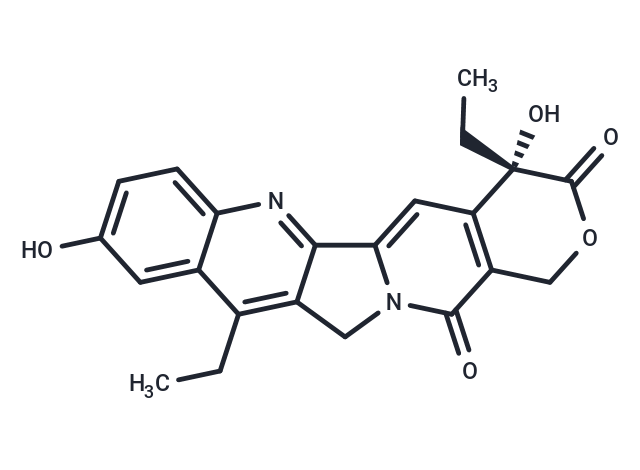Shopping Cart
- Remove All
 Your shopping cart is currently empty
Your shopping cart is currently empty

SN-38 (NK012) is the active metabolite of Irinotecan, a DNA topoisomerase I (Topo I) inhibitor, which inhibits DNA and RNA synthesis (IC50=0.077/1.3 μM). SN-38 has antitumor activity and induces autophagy.

| Pack Size | Price | Availability | Quantity |
|---|---|---|---|
| 25 mg | $39 | In Stock | |
| 50 mg | $55 | In Stock | |
| 100 mg | $77 | In Stock | |
| 500 mg | $150 | In Stock |
| Description | SN-38 (NK012) is the active metabolite of Irinotecan, a DNA topoisomerase I (Topo I) inhibitor, which inhibits DNA and RNA synthesis (IC50=0.077/1.3 μM). SN-38 has antitumor activity and induces autophagy. |
| Targets&IC50 | RNA synthesis:1.3 μM, DNA synthesis:0.077 μM |
| In vitro | METHODS: Lung cancer cells LLC, A549 and H358 were treated with SN-38 (10-1000 nM) for 48 h. Cell viability was detected using MTT assay. RESULTS: SN-38 started to exhibit effects at 10 nM concentration and induced about 50% cell death at 100 nM. [1] METHODS: Colorectal cancer cells KM12C, KM12SM and KM12L4a were treated with SN-38 (2.5 µg/mL) for 4-48 h. Cell cycle and apoptosis were detected by Flow cytometry. RESULTS: SN-38 induced S-phase and G2-phase block, with KM12L4a cells responding most strongly in a time-dependent manner. apoptosis increased over time in the KM12SM and KM12L4a cell lines, but there was no such change in the KM12C cells. [2] |
| In vivo | METHODS: To test the antitumor activity in vivo, SN-38 (2 mg/kg) was administered by single intraperitoneal injection to C57BL/6 mice transplanted with LLC cells in the peritoneal cavity. RESULTS: A single intraperitoneal injection of SN-38 significantly attenuated the growth of LLC tumors, resulting in a 22.7% reduction in tumor growth. [1] METHODS: To test the antitumor activity in vivo, SN-38 (10 mg/kg in 0.5% carboxymethylcellulose sodium, intraperitoneal injection) and gefitinib (100 mg/kg, subcutaneous injection) were administered to BALB/c nude mice bearing human oral squamous tumors HSC-2 five times per week for three weeks. RESULTS: Only gefitinib was administered to mice with human oral squamous tumors. RESULTS: There was no significant difference in tumor growth inhibition between gefitinib only and gefitinib plus SN-38 treatment. However, some tumors in the gefitinib-only group showed new growth when tumor measurements were continued after treatment was stopped. [3] |
| Kinase Assay | Topoisomerase I Assay: One unit (the minimum amount for full relaxation of 0.5 μg SV40 DNA under the conditions of this study) of topoisomerase I, 0.5 μL of the test compounds, and 0.5μg SV40 DNA are added sequentially to the reaction buffer, which is composed of 25 mM Tris-HCl (pH 7.5), 50 mM KC1, 5 mM MgCl2, 0.25 mM EDTA disodium salt, 0.25 mM dithiothreitol, 15μg /mL bovine serum albumin, and 5% glycerol. Then, the reaction mixture (50 μL) is incubated for 10 min at 37 °C, and the reaction is terminated by treatment with 7.5 μL of a solution consisting of 1% sodium dodecyl sulfate, 20 mM EDTA disodium salt, and 0.5 mg/mL proteinase K for an additional 30 min at 37°C. The samples are mixed with 5 μL of the loading buffer containing 10 mM Na2HPO4, 31.3% sucrose, and 0.3% bromophenol blue. Relaxed (form Ir) DNA is separated from supercoiled (form I) and nicked (form II) DNA by electrophoresis on 0.8% agarose gel at 50 mA and 20 V for 17 h in the presence of 2 μg/mL chloroquine, 10 mM EDTA, 30 mM NaH2PO4, and 36 Mm Tris-HCl (pH 7.8). After electrophoresis, the gel is stained with 0.05% ethidium bromide and photographed with UV light (302 nm). The amount of DNA is quantified using a densitometer. |
| Cell Research | MTT assay(Only for Reference) |
| Alias | SN 38, NK012 |
| Molecular Weight | 392.4 |
| Formula | C22H20N2O5 |
| Cas No. | 86639-52-3 |
| Smiles | C(C)C1=C2C(C=3N(C2)C(=O)C4=C(C3)[C@](CC)(O)C(=O)OC4)=NC=5C1=CC(O)=CC5 |
| Relative Density. | 1.51 g/cm3 |
| Storage | store at low temperature | Powder: -20°C for 3 years | In solvent: -80°C for 1 year | Shipping with blue ice. | |||||||||||||||||||||||||
| Solubility Information | 10% DMSO+40% PEG300+5% Tween 80+45% Saline: 3.92 mg/mL (9.99 mM), suspension.In vivo: Please add the solvents sequentially, clarifying the solution as much as possible before adding the next one. Dissolve by heating and/or sonication if necessary. Working solution is recommended to be prepared and used immediately. DMSO: 50 mg/mL (127.4 mM), Sonication is recommended. | |||||||||||||||||||||||||
Solution Preparation Table | ||||||||||||||||||||||||||
DMSO
| ||||||||||||||||||||||||||

Copyright © 2015-2025 TargetMol Chemicals Inc. All Rights Reserved.